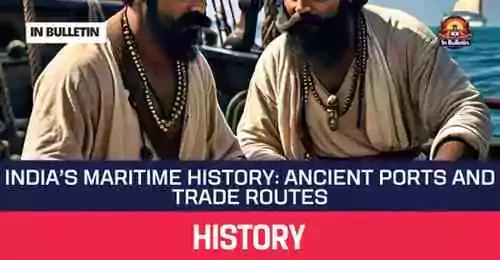India's maritime history is a story of adventure, trade, and cultural exchange, spanning for thousands of years. From ancient ports that filled with activity to trade routes that connected civilizations, India's high legacy was a testament to its important role in global commerce and culture.
The Dawn of Maritime Trade
India's maritime history can be traced back to the Harappan civilization (approx 3300–1300 BCE), which steps advanced in urban planning and a growing trade network. The port city of Lothal, located in present-day Gujarat, is one of the earliest known docks in the world. Archaeological findings suggest that Lothal was a important hub, facilitating trade with Mesopotamia, Persia, and Egypt. Artifacts found such as beads, seals, and pottery uncovered at the site indicate a vibrant exchange of goods and ideas.
Read more: Amoebic Meningoencephalitis Deaths in Kerala: Health Officials Raise Alarm.
Ancient Ports and Their Significance
Several ancient ports played a crucial roles in India's maritime trade:
1. Lothal:-
As one of the earliest dockyards, Lothal was a center for trade in beads, gems, and ornaments. The meticulously planned city had a dock connected to the Sabarmati River, allowing ships to sail in and out easily.
2. Muziris:-
Located on the Malabar Coast in Kerala, Muziris was a major port in ancient times, mentioned in Greek and Roman texts. It was a key trading post for spices, especially black pepper.
3. Arikamedu:-
Near modern-day Pondicherry, Arikamedu was a important port during the Chola period. Roman amphorae, beads, and pottery found here indicate that how often they trade with the Roman world.
4. Bharuch:-
An important port on the western coast, Bharuch (ancient Barygaza) facilitated trade with the Middle East and the Mediterranean. It was known for exporting textiles, spices, and ivory.
The Spice Route: India’s Contribution to Global Trade
India’s maritime activities were mainly comprises of Spice trade. Indian spices, particularly pepper, cardamom, and cinnamon, were highly prized commodities in Europe and the Middle East. The Spice Route connected India to various parts of the world, including Arabia, Africa, and Europe, increasingly growing economic and cultural exchanges.
Read more: A Historical Overview of India's Chiefs of Army Staff.
The Chola Dynasty and Naval Dominance
The Chola dynasty (approx 9th–13th centuries) was renowned for its naval power and maritime trade. The Cholas established a powerful navy that controlled the Bay of Bengal and the Indian Ocean. They expanded their influence to Southeast Asia, including present-day Indonesia, Malaysia, and Thailand, through both military and trade. The Cholas played a crucial role in spreading Indian culture, religion, and art across Asia.
Decline and Legacy
India's dominance in maritime trade began to decline with the spreading of European colonial powers in the 15th century. The arrival of the Portuguese, Dutch, and British reshaped the dynamics of global trade, and India's ancient ports gradually lost their dominance. However, the legacy of India's maritime history reflect a rich tapestry of cultural exchanges and economic interactions.
Read more: Evolution of Indian Education: Key Reforms from Gurukuls to NEP 2020.
Conclusion
India’s maritime history is a fascinating & interesting chapter that underscores its significant role in ancient global trade networks. From the docks of Lothal to the spice-laden ships of Muziris, India's past is a testament to its glorious spirit and cultural richness. As we explore the remnants of these ancient ports and trade routes, we gain a deeper appreciation for the maritime power that shaped India's history and connected civilizations across the seas.
For more insights into India’s rich history and heritage, stay tuned to our News blog "In Bulletin".




